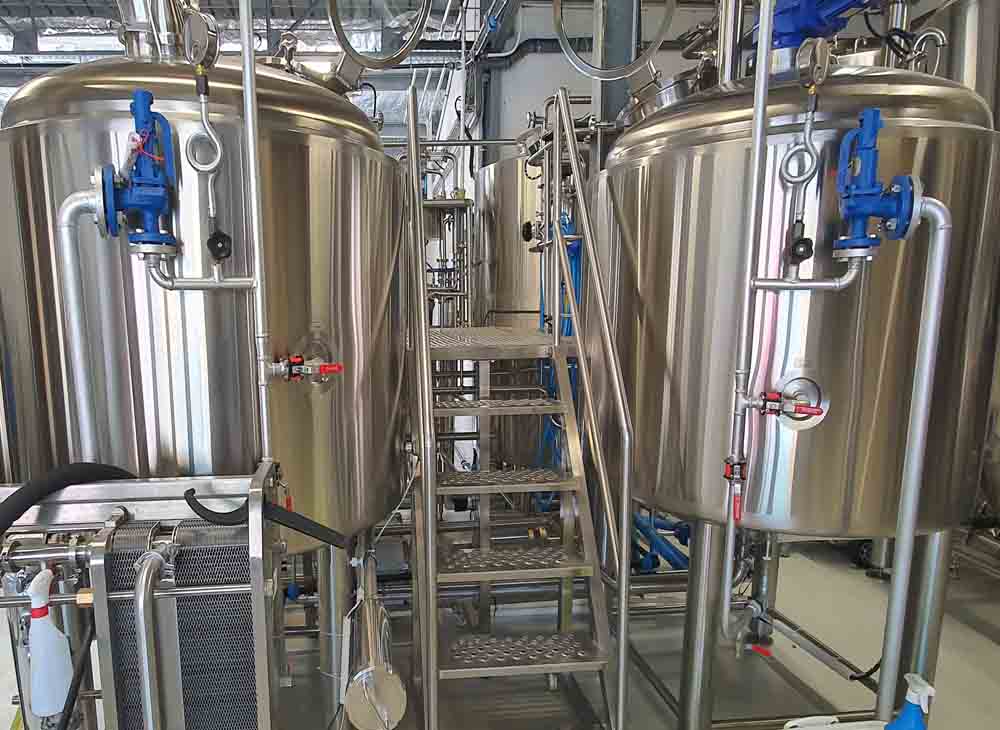Why the mash is too thick during mashing? How to solve it?
- Sep 06, 2019
- 51
- tiantai
Why the mash is too thick during mashing? How to solve it?
During the actual brewing, you may noted that sometimes the mash would be too thick to rise temperature, especially when the temperature being raised to higher level, saying at 85~90℃. That may will influence the mashing result.
The reason for this problem may be as below:
①The adjunct ingredient milling is not being controlled very well. Too much big solids being produced that could not have a totally gelatinization inside the starch granule. It cannot be proceed by the liquifying enzyme, so the mash viscosity cannot be lowered down.
②The bad quality malt with bad liquifying capacity. Or the rate of malt or zymin is not being increased, while the Alpha-amylase preparation with lower activity.
③The rate of malt to water is not reasonable. The cereal cooker with less water which caused a thick mash.
④A faster heating speed or shorter temperature keeping time when using malt as Liquefied enzyme source. It reduced the process of water absorption and swelling of starch; and shorten the effective acting time of the enzyme.
⑤Liquefaction enzymes were not used as prescribed.
And some methods could be adopted when got a thick mash:
①When finding out the thick mash or the difficult temperature raising during mashing, quickly adding some high temperature resistant amylase, it would be half of the original amount.
②Adding some hot water with temperature exceed 80℃, increasing the ratio of material to water to 6:1 or more and increasing the boiling time. Please do not add cold water that may cause starch retrogradation. The cereal mash should be cooled by stirring before combine the mash.
③Adding moderate amount of food grade sodium hydroxide liquid to have alkaline hydrolysis. Before combined the mash, the PH should be adjusted to 6.0 with phosphoric acid or lactic acid. This method should be used more carefully, a small test better be done. That may will influence the beer flavour.
Edited by Laura
Sales Manager in Tiantai Company
Email: [email protected]

During the actual brewing, you may noted that sometimes the mash would be too thick to rise temperature, especially when the temperature being raised to higher level, saying at 85~90℃. That may will influence the mashing result.
The reason for this problem may be as below:
①The adjunct ingredient milling is not being controlled very well. Too much big solids being produced that could not have a totally gelatinization inside the starch granule. It cannot be proceed by the liquifying enzyme, so the mash viscosity cannot be lowered down.
②The bad quality malt with bad liquifying capacity. Or the rate of malt or zymin is not being increased, while the Alpha-amylase preparation with lower activity.
③The rate of malt to water is not reasonable. The cereal cooker with less water which caused a thick mash.
④A faster heating speed or shorter temperature keeping time when using malt as Liquefied enzyme source. It reduced the process of water absorption and swelling of starch; and shorten the effective acting time of the enzyme.
⑤Liquefaction enzymes were not used as prescribed.
And some methods could be adopted when got a thick mash:
①When finding out the thick mash or the difficult temperature raising during mashing, quickly adding some high temperature resistant amylase, it would be half of the original amount.
②Adding some hot water with temperature exceed 80℃, increasing the ratio of material to water to 6:1 or more and increasing the boiling time. Please do not add cold water that may cause starch retrogradation. The cereal mash should be cooled by stirring before combine the mash.
③Adding moderate amount of food grade sodium hydroxide liquid to have alkaline hydrolysis. Before combined the mash, the PH should be adjusted to 6.0 with phosphoric acid or lactic acid. This method should be used more carefully, a small test better be done. That may will influence the beer flavour.
Edited by Laura
Sales Manager in Tiantai Company
Email: [email protected]





